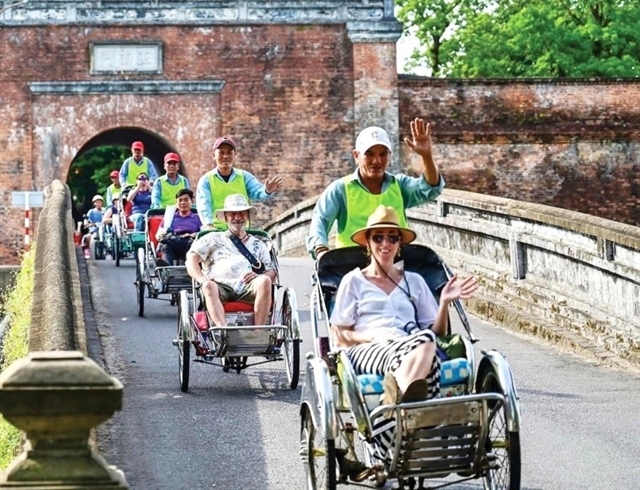 Opinion
Opinion

Minister of Transport Nguyễn Văn Thể spoke to Tin tức (News) newspaper about major difficulties the transport sector faces this year, particularly when implementing the eastern section of the North-South expressway project.
.jpeg)
|
| Minister of Transport Nguyễn Văn Thể. — Photo baotintuc.vn |
Minister of Transport Nguyễn Văn Thể spoke to Tin tức (News) newspaper about major difficulties the transport sector faces this year, particularly when implementing the eastern section of the North-South expressway project.
What are the major achievements of the transport sector last year?
2021 was very difficult for us due to the impacts of the COVID-19 pandemic. However, under the unified leadership of the Party, Government and Ministry of Transport, most of the work has been completed.
During the 4th wave of the pandemic in the southern localities, the Ministry of Transport and other ministries, branches and localities ensured smooth traffic, reduced congestion and ensured goods for residents and businesses were circulated. The most obvious result is the strong increase of imports and exports through seaports, particularly container cargo increased by 12 per cent. For the first time, Việt Nam’s railway carried goods to Europe.
2021 was also the first year that five transport plans were implemented. Up to now, four plans have been approved, the aviation industry plan has also been approved by the appraisal Council. Many key projects drawing public attention have been completed such as the Cát Linh – Hà Đông urban railway, the repair of Thăng Long bridge deck, the repair of two runways at Nội Bài and Tân Sơn Nhất airports and the North-South expressway projects are following planned progress.
Notably, despite the complicated developments of the pandemic, the Ministry of Transport was assigned to disburse more than VNĐ43 trillion (US$1.9 billion) of public investment capital and disbursed 96 per cent, meeting the plan assigned by the Government.
In addition, 2021 was the first year after ten consecutive years, traffic accidents in Việt Nam decreased in the number of cases, number of deaths, and number of injured people. In 2011, about 12,000 people died in traffic accidents, the number was halved, to about 6,000 deaths last year.
What are the key tasks the ministry plans for this year?
First, we will focus on institutional reform, implementing decentralisation policies. For example, this year, provinces will be further allowed to manage and operate inland waterway ports.
Next, we will focus on restoring transportation after the pandemic, ensuring smooth goods transportation for economic development.
At the same time, we will focus on implementing key projects, especially the eastern section of the North-South Expressway in the 2021-25 period as it was approved by the National Assembly.
It is expected that 3,000-5,000km of the expressway will be completed by 2030. Last but not least, we determine to get positive results on traffic safety with all three indicators – number of accidents, traffic deaths and injuries – reducing by 5-10 per cent.
The transport ministry hopes that the Government will continue to provide close and drastic instructions, together with the transport sector, to remove difficulties and obstacles in terms of funding and land clearance to create a breakthrough mechanism to further improve national transport infrastructure. In addition, the ministry continues asking for close coordination of localities so that traffic works can soon be completed and operated effectively.
Between 2021 and 2025, the Ministry of Transport is assigned to disburse VNĐ420 trillion ($18.55 billion) of public investment capital. Can you please tell us key solutions to complete the disbursement on schedule?
There is great pressure on the transport industry. With ongoing projects, the ministry strives to maintain the disbursement progress.
For projects that are expected to start in July and August 2022, we plan to disburse by the end of the year. The Ministry of Transport considers the disbursement of public investment an important task. We will take drastic measures to push contractors to ensure the pace of projects. The Project Management Boards must review and require contractors to commit to project progress.
In addition, those who fail to complete the disbursement task will be dismissed or transferred to another position. Slowly disbursed capital will be transferred to other projects. Projects with good disbursement will be given more.
Regarding 12 projects in the eastern section of the North-South expressway, why are they implemented with public investment rather than private?
The second phase of the projects between 2021 and 2025 requires public investment to restore the economy and strengthen infrastructure. Therefore, investment funds must be on schedule. High-speed projects, if invested under the form of public-private partnership (PPP), will face difficulties in attracting investment.
The use of the public funds for the North-South expressway projects in the second phase aims to ensure their completion by 2025, which then helps create breakthroughs, stimulate construction demand and develop the country's economy.
The Ministry of Transport has asked the Government and the National Assembly's allowance to appoint contractors and consultants to save three or four months, instead of organising biddings. The mechanism will help cut time for site clearance work and construction by six to nine months.
When implementing the 12 North-South expressway projects, what are the major challenges that the ministry expects?
Some of the biggest difficulties are land clearance, the supply of materials and the contractors’ construction capacity in dealing with weak ground and construction quality.
Drawing experiences in the construction of the North-South expressway project during the 2017-20 period, the ministry will co-operate with localities to make use of sand mining areas that are located in or surrounding road construction sites. As a result, the cost of materials could be reduced.
Another challenge is the insufficient capacity of contractors, supervisors, consultants and designers. We expect that once allowed to appoint contractors for the projects, we could select competent ones.
What do you think about the opinion that shortening the time for the North-South expressway projects could negatively affect their quality?
Ensuring the projects’ quality is a top priority. This is the lesson learned from the Đà Nẵng – Quảng Ngãi expressway project in which many officials in the industry were punished due to legal violations.
The North-South Expressway construction is planned to be completed in three years. The most difficult part of the construction is handling soft soil. The Ministry of Transport requires relevant units to hand over the surface for each specific section of the route so that constructors could have eight to ten months to strengthen the ground. They will also pay attention to selecting material sources, techniques, and consultants before construction.
The Ministry of Transport is also committed to not making any shortcuts when implementing the projects. We will not trade-off between project quality and progress. — VNS




